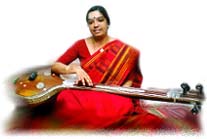

|
|
|
|
| HOME | LIFE/STYLE | TREND | |||
|
December 24, 1997
PERSONALITY
|


A quiet war is brewing in the musical portals of Madras city. It began with the dawn of Margazhi -- the month where melodious ragas and the sound of tinkling ghungroos take over this otherwise commercial city. This year, though, resentment is rife in the cool December air. Ever since Hamsadwani, a reputed young music sabha, announced a music festival that would feature only Non Resident Indian performers. Ramachandran of Hamsadhwani explains the reasons behind organising an exclusive NRI music festival during the season itself. "Our annual festival is held in March-April when the scene is not crowded at all. Some of the NRIs who performed here last year expressed a desire to sing during Margazhi. Faced with an increasing amount of such requests, we decided to give them a platform." But NRI musicians as a whole, and this unique festival in particular, are facing a lot of negative attention. Though the puritans and many local musicians welcome NRIs as rasikas -- they bring in money to both the sabhas and the city -- they are not accepted as performers.
"Please don't bracket me with the other NRI musicians," pleads Trichy Sankaran, professor of Indian music studies, York University, Toronto. Though a postgraduate degree holder in economics, music has always been his first love. He performed as an accompanist to many of the top-ranking Carnatic musicians before he was invited, in 1971, to start a department for Indian music at the York University. "I'm in Madras," said Sankaran, "because I want to interact professionally with the local musicians. Coming here to perform in December will not lift any artiste's stature. Nor can the NRI musicians be compared with the stalwarts who are the stars of the music season. Besides, there is a degree of difference between the youngsters who are making waves here and the NRIs. But what ultimately matters is dedication. And the NRIs come here only because they want to get established. Those who are known names, on the other hand, perform in foreign countries." The enthusiasm displayed by the NRIs has received much criticism; the main accusation being that NRIs get a chance to perform during Margazhi only because they have money. This, despite the fact that most of them are singing on the platforms of other sabhas too.
Is there any truth in the criticism that sabhas collect money from mediocre NRI artistes for providing a platform them to perform on? "No," says Ramachandran vehemently. "The NRIs are as good as, if not better, than many middle level artistes because they use their time extremely judiciously. Their devotion to music is total. Besides, Hasmsadwani offers all artistes an opportunity to perform." Suja Srinivas, who has been performing during the season since 1992, comes to India twice a year to learn music from stalwarts like D K Pattammal and T M Thyagarajan. "I practise relentlessly," she says, "so how am I different from the other singers who reside in India? How can the puritans question my dedication just because I stay in Hong Kong?" When not performing, she attends as many concerts as she can. All the NRIs who come here to perform are attacked mercilessly by the conservatives. Is it fair, they ask? A valid query. "I have heard," says Srinivas, "that there is a lot of hostility towards NRI musicians here, though nobody has criticised me directly. But why should hostility exist? We may be NRIs now, but we have lived in India, learnt music here and, now, we have come here to perform. In what way will this affect local musicians, or seniors, for that matter? As far as standards are concerned, we are on par with anyone else. Like all serious musicians, I am continuously improving and upgrading myself. This allegation, that we perform on the basis of limited knowledge, is baseless. I give some 14-15 concerts each season, while local musicians get at least 20 concerts in a month. How can you compare us?" Srinivas also points out that music lovers in Hong Kong invite senior and junior singers from India to perform there, for which they are paid handsomely. Besides, they receive similar invitations from many other countries. "Why should anyone make any kind of geographical distinction? A local musician would like to perform in a foreign country; they make more money that way and their value professional increases when they return. Under the circumstances, it is absolutely unfair to criticise to us." Dr Balu Sekhar learnt Carnatic music in a small village in Tamil Nadu and gave his first concert at the age of 14. Later, armed with a degree in science, he moved to the United States as a scientist. And began working for more than 12 hours a day, which left him with less and less time for music. He tries to make up for lost time by practising on his way to work. "What is wrong in an NRI singing, if his music is good? Actually, NRIs are devoted to music. Despite of all the difficulties they face, if they still practise and deliver decent music, they should be encouraged and appreciated. They do not sing for money or other material benefits."
"We do," Ramachandran clarifies, "request NRIs -- both musicians and rasikas -- to become our patron members. But we function in total transparency." And, as Sankaran points out, there is nothing wrong in asking anyone to become patron members. "Sabhas may not ask for money directly," adds Dr Sekhar, "but many of them do ask us for monetary aid. If it is a genuine request, I do pitch in with a donation. But I don't want to do a concert by paying money. It's not ethical. To me, music is a path to achieve inner peace and happiness, it is a bridge which connects me to my country and culture."
Photographs: Sanjay Ghosh Tell us what you think of this article
|
|||
|
HOME |
NEWS |
BUSINESS |
CRICKET |
MOVIES |
CHAT
INFOTECH | TRAVEL | LIFE/STYLE | FREEDOM | FEEDBACK |
||||